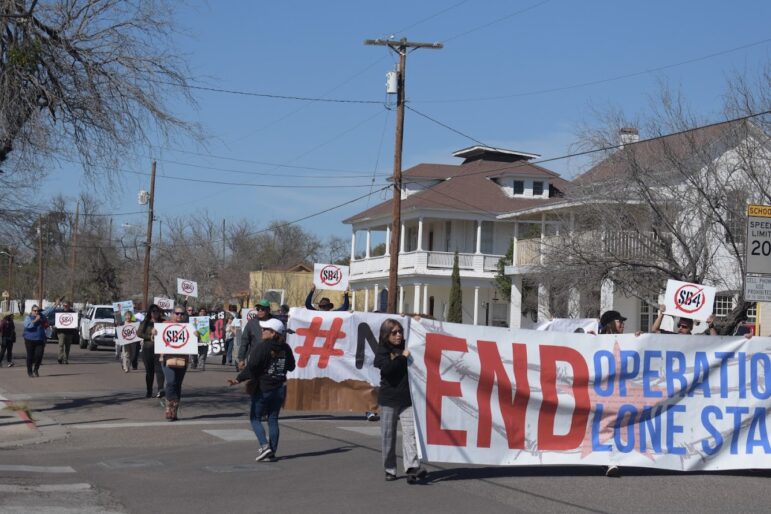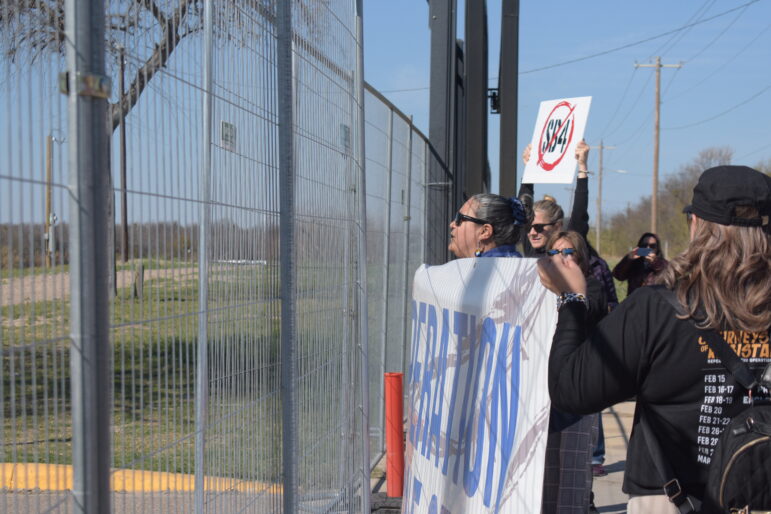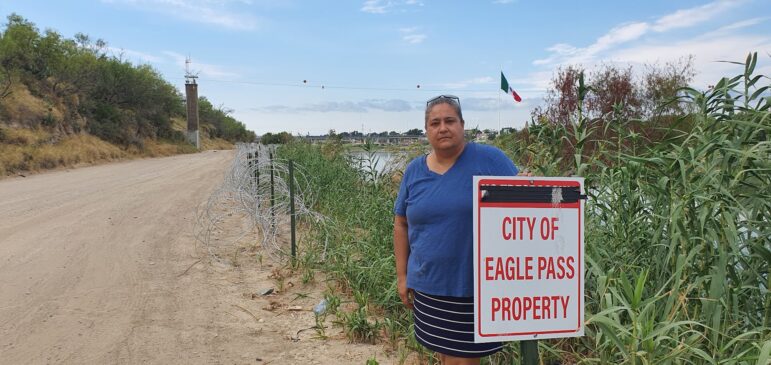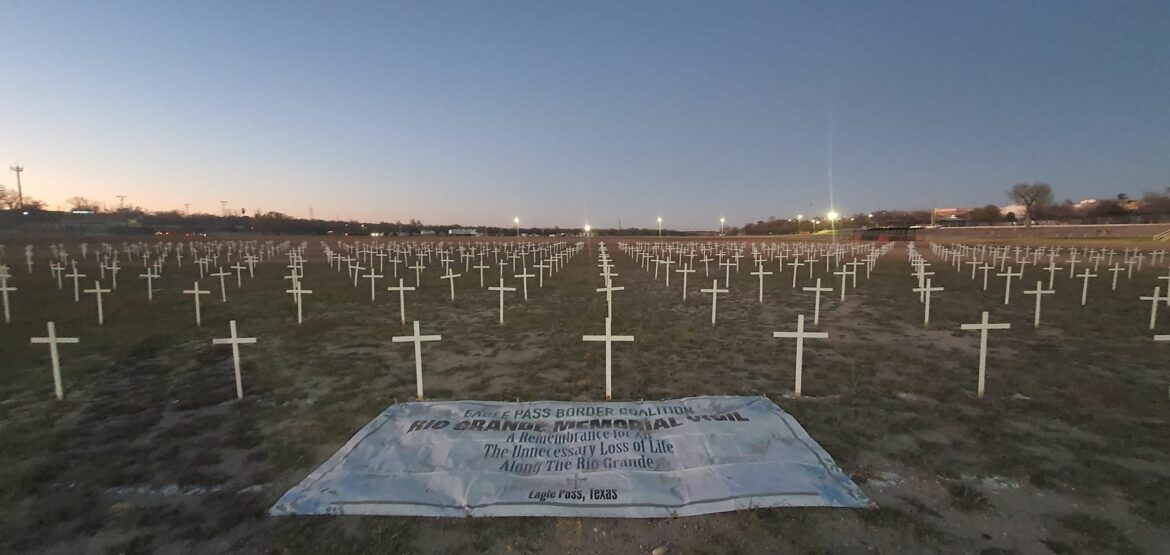
Above, Eagle Pass, Texas area residents protest Operation Lone Star and SB 4, on Feb. 18. Photo by Vicky Martinez

Arnie Alpert spent decades as a community organizer/educator in NH movements for social justice and peace, including a year as a member of the Clamshell Alliance office collective. Officially retired since 2020, he keeps his hands (and feet) in the activist world while writing about past and present social movements. He writes an occasional column Active with the Activists for InDepthNH.org
By Arnie Alpert, Active with the Activists
EAGLE PASS, Texas – While Texas Gov. Greg Abbott has repeatedly railed against an “invasion” of migrants crossing the Rio Grande River into Texas, some residents of Eagle Pass, a border town where Abbott has taken over a city park and plans to build a new military base, are experiencing an invasion from the other direction.
Sixty-one Republican members of Congress led by Speaker of the House Mike Johnson held a press conference there in January. Hundreds of far-right activists, some armed, convoyed to the border community on Feb. 4. New Hampshire Gov. Chris Sununu and 12 other Republican governors joined Abbott there the same day. Donald Trump, who can’t resist an opportunity for the limelight, was there with Abbott on Feb. 27. Each delegation was accompanied by scads of reporters, few of whom seemed to express much interest in what the local community has to say.
The biggest and most heavily armed group of invaders are Texas police and members of the National Guard, mobilized under Abbott’s Operation Lone Star. In February, Abbott announced plans to build a new military base in Eagle Pass to house upwards of 2,000 National Guard members. Following a special appropriation of $875,000, fifteen members of the New Hampshire National Guard will be among them for a 90-day deployment beginning around the first of April. Troops and police from Tennessee, South Dakota, Florida, Missouri, Montana, Indiana, Utah, Iowa, and possibly Alaska are headed there, too.
At the national level, Eagle Pass is seen as the site of a conflict over authority to enforce immigration law, with Shelby Park as the center stage. The Eagle Pass Business Journal calls the controversy “an epic political and legal battle between Governor Greg Abbott and the State of Texas with the United States government under President Joe Biden regarding the enforcement of American immigration law.” But at the local level, residents who see their governor as an authoritarian and a grandstander mostly want their town and their park back, as well as a compassionate response to migrants passing through their community.

Above, Amerika Garcia Grewal is pictured at the Shelby Park fence on Feb. 18. Vicky Martinez photo
When the Eagle Pass Border Coalition started in 2019, it was basically just an email list of people concerned about the impact of the border wall, says Amerika Garcia Grewal, an Eagle Pass native. When Gov. Abbott announced he was placing buoys in the Rio Grande last year and began lining the river with coils of concertina wire, the group became more active.
As Grewal describes it, Eagle Pass is a small city with mostly Mexican-American residents. It’s always had a close connection to Piedras Negras, the Mexican city on the other bank of the Rio Grande (or Rio Bravo, as it’s known in Mexico). With the school department and the federal government providing the bulk of employment, residents are generally disinclined to rock the boats of agencies responsible for their livelihoods, Grewal explained. But deaths of migrants in the river were something they couldn’t ignore.
The coalition held a vigil at the boat ramp in Shelby Park last Aug. 7 after the first bodies were found trapped in Abbott’s buoys. But when more drowned bodies were found in the river between Eagle Pass and Piedras Negras the next day, they agreed to hold vigils on the first Monday of each month featuring prayer, singing in Spanish and English, and pleas for healing. “What we found,” Grewal explained, “is that by having a vigil every single month, people start to realize, oh, wait, it’s not just here and there. Every week, people are dying here in Eagle Pass, every single week.” Whatever political views people hold, she said, they ought to be able to agree that too many people are dying.
Last Christmas season, when hundreds of Mexican-American families were crossing into Mexico to visit their families, the coalition placed 700 crosses in Shelby Park where they’d be visible from the international bridge. “We wanted to capture the attention of everybody who was crossing the Rio Grande,” Grewal said.
Shortly after Christmas, “the State of Texas invaded Shelby Park and took it over, reinforced it with even more concertina wire,” says Grewal. They even kicked out personnel from the federal Border Patrol. Mayor Rolando Salinas, Eagle Pass’ mayor, said the State had given no advance notice. “This is not something that we wanted. This is not something that we asked for as a city,” he said.

Above, Amerika Garcia Grewal is pictured standing by barbed wire. Justin Hamel photo
As he had with the buoys, the concertina wire, and the bulldozing of islands in the river, Gov. Abbott used a disaster declaration to assert authority over the park. Grewal calls him “mad with power.”
“Our beautiful and safe public park has been taken away from us, and turned into a military style staging area, now being used as a backdrop for political theater by you, who live over 200 miles away, and out-of-state politicians,” the Eagle Pass Border Coalition wrote in an open letter to Gov. Abbott on Feb. 7. “Local residents can no longer use our park for fishing, kayaking, flea markets, sports, barbecues, quinceañeras, or to have our children play, as we did daily for generations.”
The coalition held a “March to Take our Park Back” on Feb. 18. They’ve also protested against a new Texas law which would enable local police to arrest people they believe to be unauthorized immigrants. The law, known as SB 4, was recently upheld by a federal appeals court after being struck down in federal district court. The Biden Administration will appeal, asserting that only the federal government can enforce immigration law.
When Donald Trump staged an event with Gov. Abbott in Shelby Park on Feb. 27, the Eagle Pass Border Coalition held its own news conference nearby. Beginning and ending with prayers offered by local pastors, coalition members and allies expressed their own views on Operation Lone Star, Trump’s presence, and the militarization of the border region. They don’t want the concertina wire, the drones, the armies, the unwarranted police stops and chases on local highways, or an 80-acre military base in their town. They’d love to see the tax dollars getting sucked up by Operation Lone Star used for local schools, mental health, and water infrastructure. “We need to invest in humane solutions to keep both US citizens and immigrants safe,” added Karen Gonzalez from the nearby community of Del Rio.
They’d also love to sit down with their governor. Jessie Fuentes, who runs a canoe and kayak business, has a message for the governor: “You need to change your ways,” he said at the press conference.
The billions of Texas tax dollars going into Operation Lone Star “could go into infrastructure, education, health care, and making sure that the people on the border are listened to, because every time that you come here, we have to do this on our own,” he said. “Governor, what are you afraid of? I’ll have that one-on-one with you, and I’ll tell you what we really need in our community.”
On the same day, the San Antonio Express News reported that the $171 million contract to build the new National Guard base had been awarded to a firm called Team Housing Solutions. With some 27,000 homeless Texans according to the most recent point-in-time count and the rate of homelessness up by 12% last year, it’s hard to escape the irony. The new base will be partially built by the time New Hampshire National Guard members arrive.
For Amerika Garcia Grewal, the whole controversy reveals as much about conditions north of the border as it does about migration. “All these people coming into the United States, they’re not causing shortages of affordable housing,” she said. “They’re not causing issues with homelessness. They’re not causing shortage of benefits. They are highlighting that our social networks are already very, very weak.”
Instead of repairing the cracks in the system, Greg Abbott’s approach is just making it worse. “We need economic development, we need affordable housing, we need, you know, a better way to get benefits to people in these different cities. Instead, we’re blaming the victim,” she said. “We are saying that these immigrants who are trying to just survive aren’t the problem, when really what they’re doing is showing our problems more clearly than they’ve ever been shown before.”





